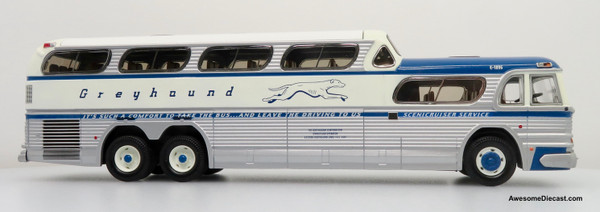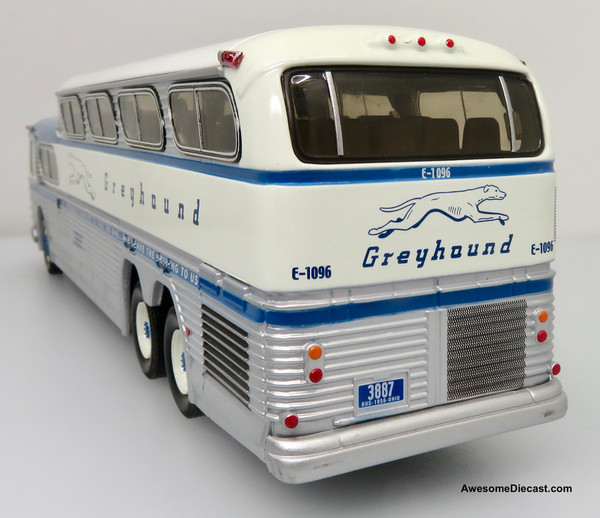Corgi
Corgi 1:50 GM PD-4501 Greyhound SceniCruiser: New York, NY - SceniCruiser 50th Anniversary Edition (1954-2004)

Corgi 1:50 GM PD-4501 Greyhound SceniCruiser: New York, NY - SceniCruiser 50th Anniversary Edition (1954-2004)
$2,802.15
The mirrors for this model are in the box.
Shelf wear on the box.
The GMC PD-4501 Scenicruiser, manufactured by General Motors (GM) for Greyhound Lines, Inc., was a three-axle monocoque two-level coach that Greyhound used from July 1954 into the mid-70s. 1001 were made between 1954 and 1956.
The Scenicruiser became an icon of the American way of life due to its presence throughout the US in cities and along highways and popularity with the traveling public. The name was a portmanteau of the words "scenic" and "cruiser".
The high-level design concept of Scenicruiser resembles some of the rolling stock of the passenger-carrying railroads of the United States and Canada, particularly their popular stainless steel dome cars. This type of two-level motorcoach body was common in the late forties in Western Europe, including Great Britain where it was known as Observation coach.
The concept of two-level monocoque body had been used earlier in the Spanish Pegaso Z-403 two-axle coach, designed in 1949 and entered production in 1951
The Model PD-4501 as GMC called it was the most distinctive American parlor bus design of the modern era. It was the result of seven years of effort by Greyhound and GM Truck and Coach Division. The first GX1 prototype was based on a design by Raymond Loewy as U.S. Patent 2,563,917. Originally conceived as a 35-foot (10.67 m) bus, Greyhound later used a tandem-axle 40-foot (12.19 m) prototype by Loewy called the GX-2 to lobby for the lifting of length restrictions of buses longer than 35 feet in most states at the time.
Power for the production models was originally provided by a pair of GM Diesel 4-71 four cylinder engines of 160 HP each connected by a fluid coupling. Two engines were necessary because GM had not yet built a V8 version of its Series 71 diesel engine. Each coach had a single three-speed transmission with a manual two-speed clutch for six forward speeds. There were some problems when the coaches were new because all of Greyhound's other models had four-speed manual transmissions that shifted differently than those in the Scenicruiser. This meant additional training for drivers, who mostly disliked the new system. This installation proved to be less than successful, and the 979 buses remaining in 1961-62 were rebuilt with 8V-71 engines and four-speed manual Spicer transmissions by the Marmon-Herrington Company.






















